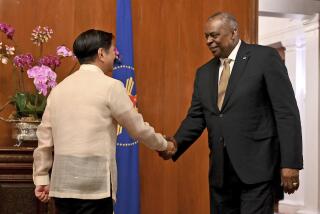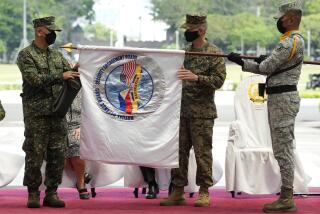U.S., Japan Lead 19-Nation Plan to Aid Manila
- Share via
TOKYO — Led by the United States and Japan, 19 nations and seven international financial institutions Tuesday launched a multinational aid program for the Philippines that Secretary of State James A. Baker III called “critical to the future of democracy” there.
In addition to $480 million a year in aid already committed for the next two years, Baker said the United States plans to provide $200 million a year in extra assistance for the five-year multilateral program.
Japan, which for the first time joined the United States in co-sponsoring a multilateral aid program, did not announce a five-year pledge. But Foreign Minister Hiroshi Mitsuzuka told a three-day international conference here on Philippine aid that his nation, already the largest donor to the Philippines, will give 135 billion yen ($957.8 million) this year, a sum only slightly larger than previous pledges.
Twelve member nations of the European Commission will triple their aid, to about $350 million, said French Ambassador Bernard Dorin, speaking for the 12-nation European Community.
Other Pledges Today
Other individual countries and financial institutions are expected to reveal their pledges today.
No announcement was made on the overall amount of aid that the Philippines will receive from the group, which includes South Korea, Singapore, Saudi Arabia and Kuwait.
Taiwan, which has no diplomatic relations with Manila and was not present at the meeting, also is expected to contribute aid to the Philippines for the first time--but outside the framework of the new package.
The program has been billed as a $10-billion plan, including both old and new aid pledges as well as $5 billion worth of private investment that the donors hope foreign firms will make in the Philippines.
Friendship Day
Baker noted that the commitment was being made on the Fourth of July, celebrated as “Philippine-American Friendship Day to reinforce our traditionally close friendship.”
“Our purpose here today is much more than strengthening economic reform in just one country,” Baker said after arriving in Tokyo from Washington. “It is to express in tangible ways our commitment to the success of democracy and to the success of freedom.
“In country after country in the world today . . . we see (that) development heightens demands for democracy--and without democracy, economic progress cannot be sustained.”
He called the multilateral program “critical to the future of Philippine democracy,” which, he warned, “remains fragile and under attack.”
Raul Manglapus, the Philippines’ foreign secretary, called the holding of the donors’ conference on the Fourth of July “felicitous.” He praised Sens. Alan Cranston (D-Calif.) and Richard G. Lugar (R-Ind.), Rep. Stephen J. Solarz (D-N.Y.) and former Rep. Jack Kemp (R-N.Y.), the lawmakers who first proposed the special multilateral aid program in 1987, as well as President Bush and former President Ronald Reagan for their support of it.
Neither Baker nor Manglapus mentioned it, but July 4 also is the anniversary of the day in 1946 that the United States granted the Philippines its independence from American rule.
To the conference participants, Manglapus declared: “What is this but a conclave of democracies . . . offering aid to a democracy in need, which gratefully accepts?
“Democracy is no longer the wave of the future,” he added. “It is the wave of today.”
$28-Billion Foreign Debt
Manglapus said his nation needs help because of its $28-billion foreign debt accumulated under former President Ferdinand E. Marcos and the $3.6 billion it must repay each year.
Both Baker and Mitsuzuka stressed that the Philippines must reduce the level of poverty, which afflicts about half the Filipino population. Mitsuzuka also urged the Philippines to carry out a more equitable distribution of income, implement agricultural reform and bring about “justice in society.”
The European Commission representative also urged the Philippines to improve its capacity to use aid.
But Baker, talking to reporters on the flight to Tokyo, brushed aside suggestions that the Philippines already has more money in the pipeline than it is able to spend.
A Backlog of Funds
“What this means to me is, yes, there is some backlog in the system, but they’re being careful not to . . . waste funds by insisting on appropriate reforms before dispensing or disbursing,” he said.
A senior State Department official said later that Washington, and perhaps other donors as well, might “backload” the assistance, providing a larger share of the money in later years after the Philippine government takes additional steps to improve its ability to absorb the funds.
In a videotaped message, President Corazon Aquino pledged to carry out agrarian reform, rid Philippine society of its “unjust and semi-feudal practices” and reduce poverty by 1992.
Baker leaves today for Brunei, where he will attend the annual meeting of foreign ministers of the Assn. of Southeast Asian Nations. He is also scheduled to visit Oman before joining Bush in Warsaw at the start of the President’s trip to Poland, Hungary and the Netherlands and to the seven-nation economic summit in Paris.
More to Read
Sign up for Essential California
The most important California stories and recommendations in your inbox every morning.
You may occasionally receive promotional content from the Los Angeles Times.












